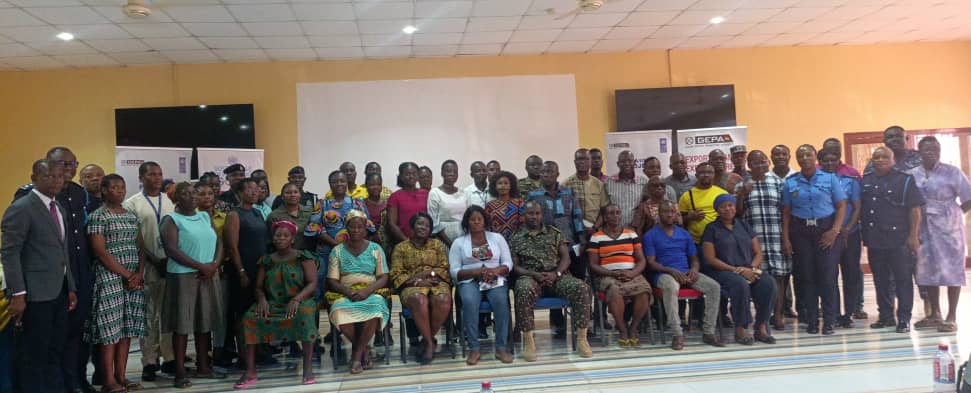By Ewoenam Kpodo
Aflao (VR), Nov 28, GNA – The Ghana Export Promotion Authority (GEPA) has hailed the resilience of Micro, Small and Medium Enterprises (MSMEs) as a crucial factor in the country’s economic prosperity.
Osafohene Dr Afua Asabea Asare I, Chief Executive Officer, GEPA through her representative, Mr Banda Z.K. Abdallah at a day’s training workshop at Aflao, Ketu South said women and youth-led businesses were not only critical to Ghana’s economic recovery but also instrumental in achieving long-term sustainability.
The workshop, a GEPA/United Nations Development Programme (UNDP) project titled, “Building Resilience of Women and Youth-Led MSMEs through African Continental Free Trade Area (AfCFTA) for Green and Inclusive Recovery and Growth” which aimed to empower women and youth-led MSMEs across Ghana. It was earlier held at Elubo and Paga.
Osafohene Dr Asare explained the initiative sought to ensure that women and youth entrepreneurs build resilient, green, and inclusive businesses that would drive growth and sustainability in their communities and beyond disclosing that, the first two sessions of the project were successful as the Elubo session explored how cross-border trade could venture into new markets and create opportunities for local enterprises.
She said the Paga one delved into the importance of capacity building and innovation in overcoming challenges posed by economic barriers and hoped that the Aflao series would provide actionable insights and support that would enable MSMEs to navigate the AfCFTA framework effectively.
“GEPA and UNDP remain committed to working closely with all stakeholders to create an enabling environment for MSMEs to flourish. As we move forward, let us remember that the resilience of our MSMEs is intertwined with the prosperity of our nation. By empowering women and youth, we are laying the foundation for a future where Ghana becomes a key player in regional and global trade.”
The Aflao workshop brought together key stakeholders from relevant public and private sector institutions, whose mandate and operations relate to cross-border trade, emphasising the importance of collaboration, adaptation to eco-friendly practices, and leveraging the platforms of all stakeholders.
Revenue Officer Fitz-Gerald Arthur, on behalf of Assistant Commissioner Joseph Allan, Aflao Sector Commander, Customs Division of the Ghana Revenue Authority (GRA), said Customs, charged with three-fold responsibilities of mobilising revenue, facilitating legitimate trade and providing public security and safety, had been facilitating cross-border trade through various initiatives and collaborations.

These initiatives include national single window system for Customs clearance, electronic submission of documentation before arrival of cargo, risk-based audit approach and, encouragement of trade compliance and security which had led to reduced barriers to trade, increased revenue collection, and reduced smuggling and fraud.
Madam Thywill Eyra Kpe, Gender Consultant, highlighted the significance of promoting gender sensitivity and inclusiveness in cross-border trade, a female and youth-intensive sector with poverty and development implications.
She said while the sector was a vital component of regional and global commerce, it also served as a crucial source of employment and livelihood support for low-income and low-skilled women and youth.
She said by addressing unique challenges like places of convenience at the borders, changing rooms for mothers carrying their babies, and financial support to others for example and promoting their empowerment, it could create a more inclusive and equitable trade environment that would benefit the national economy.
Mrs Nelly Joana Spio-Abaidoo, Principal Export Development Officer, GEPA said addressing constraints faced by small-scale cross-border traders, particularly women and youth, was important in promoting economic growth, reducing poverty, and enhancing food security in the sub-region.
She identified challenges like documentation processes, harassment of youth and regulatory issues, suggesting, there must be help desks at the borders to help simplify issues to them and give priority to women with children among others to enable them to operate efficiently and effectively.
Mr Oscar Akaba, Coordinator for National Cross-Border Women Traders Association, said there needed to be more engagements with cross-border women traders to get their numerous issues and address them towards removing barriers in the sector.
Madam Selina Kotoku, a cross-border trader commended GEPA and UNDP for championing the cause of cross border women and appealed for issues of security and places of convenience to be prioritised.
GNA